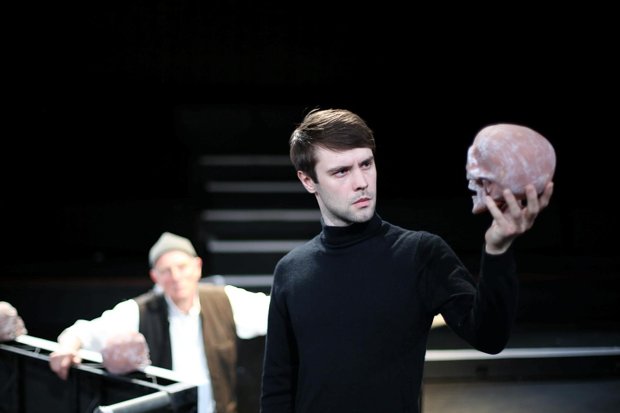Hamlet at the Cockpit Theatre, NW8
reviewed for The Times, 8th April 2016

Image Credit: Charles Ward
![]()
The 400th anniversary of the Bard’s death is only a few weeks away, so ’tis the season of Shakespearean press releases. The media campaign for this staging of the “bad quarto” script for Hamlet, the earliest published text, wants us to rehabilitate it as “Shakespeare’s first draft”. This is a bit like someone in 200 years digging up a Chinese pirate copy of Harry Potter and the Half Blooded Relative Prince and republishing it as an early JK Rowling.
The truth, of course, is that mainstream scholarship has known about this edition — of which only two copies survive — for nearly 200 years. The text is almost certainly a black market reconstruction by a bit-part actor who remembered his own parts perfectly and mangled everybody else’s.
The director Charles Ward’s sensible programme note points out rightly that this gives us a chance to view the play through the eyes of one of Shakespeare’s first players, a clue to early stagings. Yet if the bad quarto ever engages an audience of more than Shakespeare completists it won’t be through this disappointing exercise in amateur pretension.
Better actors would struggle to give life to the drab language of the bad quarto’s author. (Shakespeare’s metaphors become hopelessly mixed; cheap hendiadys abounds.) So Nicholas Limm’s Hamlet spews soliloquies at a rate of knots, running over each line like a glissando on speed. If you’ve come to hear this rarely performed text you’re unlikely to actually catch it.
There are glimpses of innovation in Ward’s staging: Claudius surveys his courtiers, packed liked sardines into the confines of a single upturned table until Hamlet, bit-player in his own kingdom, emerges from the middle of the pack. Frustratingly, they’re few and far between.
What else do we learn about the quarto’s author? He didn’t listen much to female characters. So the promising Maryam Grace has scant scope with “Ofelia”, though Pauline Munro does little with “Gertred’s” famous extra scene, in which she denounces Claudius. Aptly, there’s no dramatic nuance in the play-within-the-play. Hardly a work of genius.






